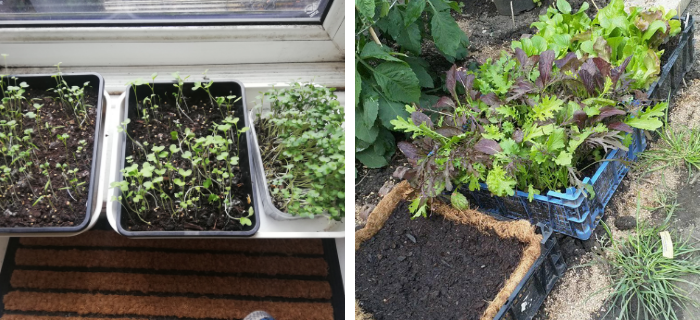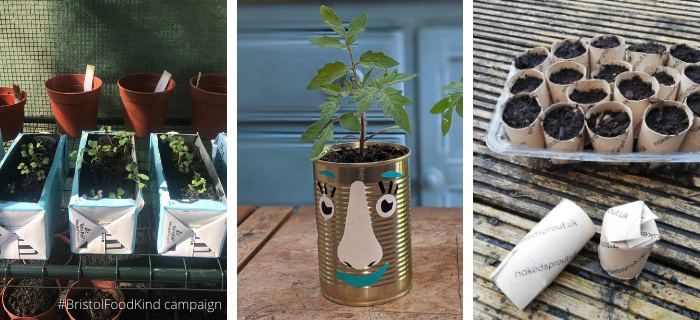Grow your own to shrink your waste

Tasty ways to reduce your waste
Food packaging is one of the biggest sources of rubbish in our bins. Why not grow your own food to help cut down on that pesky packaging and reduce those food miles!
Grow edible plants indoors
The good news is that even if you haven’t got any outdoor space, there are still plenty of edible plants you can grow indoors:
- Salad leaves are one of the hardest things to find unpackaged. Growing your own cut-and-come-again salad from seed is a great way to get fresh, packaging-free greens.
- Cut herbs are also often heavily packaged, but growing herbs in pots indoors can give you a supply all year round. Find out which herbs grow best indoors.
- Seed sprouts such as alfalfa, sunflower, radish, bean, lentils, and peas make a delicious addition to salads and can be sprouted in a jar in just a couple of days.
- Microgreens are seedling versions of plants like peas, radishes, broccoli, carrots, celery, or beetroot. They are harvested when they are still small and can grow densely in a small space. It should take just a week or two for them to grow, and they are a great addition to a salad.
- Edible mushrooms can be grown indoors in just a couple of weeks using a grow kit. They grow well in darker places away from direct sunlight.
- Chilli plants make great house plants that love a sunny windowsill.

Reuse your containers
If growing from seed you’ll need some trays, pots, or containers to start your seedlings off.
- If you have plant pots or propagation trays from previous years, reuse them.
- You could try making your own biodegradable pots out of toilet rolls, egg boxes, or newspapers.
- Repurpose used yogurt pots, tubs, punnets, trays, or cartons to make growing containers. Just make sure to put some holes in the bottom for drainage.
Check out loads more reuse ideas for growing here.

Waste-free compost options
Buy it loose – our Reuse Shop at our Avonmouth Reuse and Recycling Centre sells compost by the bucket, £1 for 15L. It’s 100% peat-free, made from the garden waste collected from our sites, and you can bring your own containers to take it away. The team will also deliver large amounts for a discounted cost if required, have a look at our compost page for more detail.
Reuse your packaging – if you get big bags of compost from a supermarket or garden centre, there are lots of ways you could reuse the sacs; as bin liners, garden waste sacks, potato grow bags, hanging basket liners, weed barriers, for making leaf mulch, or you could even make one into a gardening apron!
Make your own – options include:
- A garden compost bin – used to compost garden waste, and vegetable peelings. You can purchase one on the Council’s website
- A hot compost bin – a thermally insulated compost bin. Raising the temperature helps the compost break down quicker. They can also break down more types of food waste than a normal compost bin including meat and cooked food.
- A wormery – this is good for composting food waste and creates a rich compost and liquid fertilizer.

Alternative ways to grow or pick your own
- Allotments – if you want to grow more than the space you currently have allows, then an allotment could be a good solution. Waiting lists vary considerably across the city, but anyone can join the list.
- Incredible Edible Bristol – a network of over 40 publicly accessible growing spaces across the city where anyone can help themselves to what’s growing.
- Bristol Food Network – a map and guide showing local growing spaces and projects where you can get involved. Check with individual locations for their arrangements during COVID-19 restrictions.
- Foraging – a lot of food grows naturally in our green and wooded spaces, and there are different edible plants available throughout the year. Make sure you know what you are looking for and follow responsible foraging guidelines.
- Pick-your-own – visit a pick-your-own farm and take your own containers and bring back a packaging-free hoard.
